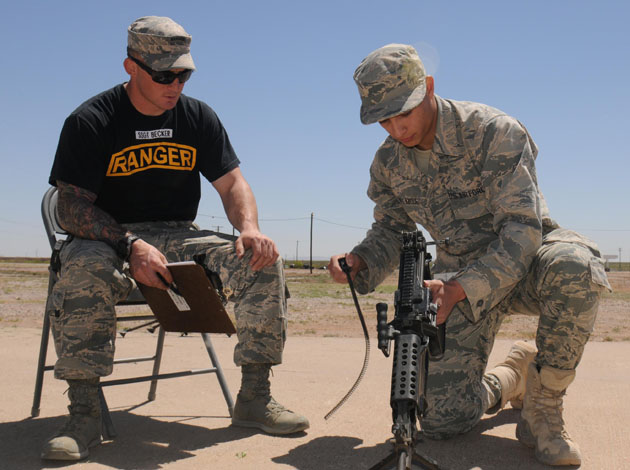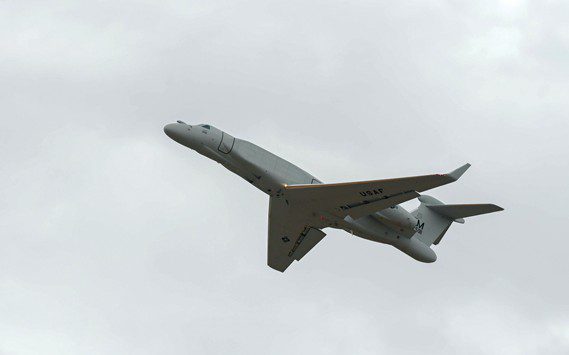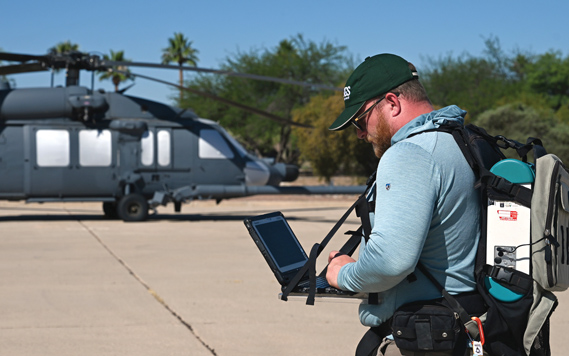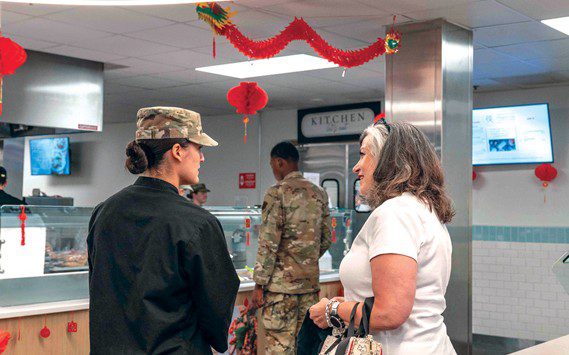FORT BLISS, Texas (AFNS) — “If you don’t care about the man to the left or right of you, get back on the bus and go home,” shouted Air Force Master Sgt. Gabe Rodriguez, as he watched 24 pre-Ranger candidates struggle to low-crawl up a sandy hill in the New Mexico desert April 20.
Rodriguez is one of less than 40 actively serving Ranger-qualified Airmen. While his full-time job is at the Air Force Security Forces Center at Joint Base San Antonio-Lackland, Texas, he has an equally important part-time job — selecting the next generation of Airmen to attend U.S. Army Ranger School. It is a job that he, and his fellow Ranger instructors, take very seriously.
About 50 to 60 Airmen a year volunteer to attend the bi-annual AFSFC Pre-Ranger Course at Fort Bliss. Passing the course, which mirrors the first two weeks of Ranger School, is a requirement to attend the school.
“I love getting out of my office and be with guys who volunteer to challenge themselves,” said Senior Master Sgt. James Wilfong, a Ranger instructor. “It’s nice to get back in the dirt and train the next generation of Rangers.”
Wilfong, a security forces Airman at Nellis AFB, Nevada, has served as an instructor at the Air Force’s Pre-Ranger school 13 times.
Ranger School began in September 1950, with the first class graduating two months later. Within a few years, the Air Force began sending its personnel to Ranger School. To date, over 280 Airmen have successfully completed the school. While this number may not seem very high, the Air Force has only authorized 10 slots per year.
Unlike the Army, the Air Force does not have dedicated instructors who teach the course. Instead, a request is sent out to the Air Force Ranger community a few months before the start of each course, requesting volunteers to serve as instructors.
“This is a small community,” said Air Force Capt. Ralph Johnson, a security forces officer at the AFSFC. “We all pretty much know each other, and most of us have served as RIs many times.”
To get up to speed on any new regulations, and to make sure that they are providing the candidates with the best possible training, the instructors are assisted by the Fort Bliss Iron Training Detachment’s pre-Ranger instructors.
“The partnership and support of the Army has been phenomenal,” said Chief Master Sgt. Benjamin Del Mar, a Ranger instructor. “They are all trained at Fort Benning, so they are able to validate the course.”
Del Mar said that prior to working with the Iron Training Detachment, the Ranger School used to send an instructor from Fort Benning, Georgia, to validate the course.
While the Air Force and Army Pre-Ranger Courses are nearly identical, there is one big difference. In the Army, a candidate can be sent home for failing to meet course standards. In the Air Force, the only way a candidate can be dropped is due to injury or for lack of motivation.
“LOM, as we call it, is when a candidate requests to quit the course,” Johnson said. “When that happens, we immediately separate them from the other candidates, make sure they understand that by quitting they will not be allowed to return, and then let them sleep before sending them back to their unit.”
One of the reasons the Air Force allows candidates to remain in pre-Ranger, even when they have been eliminated for consideration to attend Ranger School is the benefit for the Airman and his unit.
“It is our policy that any Airman who attends our course be allowed to finish regardless of how they are doing,” Del Mar said. “This course is the premier leadership course the Air Force has. The candidates learn to be better more resilient leaders.”
Del Mar, who graduated from Ranger School in 1997, currently serves as the security forces manager at Aviano Air Base, Italy, and has been a Ranger instructor 13 times over the years.
While a high number of drops are expected in a physically and mentally challenging course like Pre-Ranger School, it doesn’t make it any easier for the instructors.
“I get upset when we have to drop guys,” Wilfong said. “Every single candidate wants to be here. They all volunteered to come here; we don’t like sending them home.”
Each Pre-Ranger class has about 25 Airmen in it. About half of them will not make it through the class due to injury or LOM; of those that make it through, only about two to four will be recommended for Ranger School. However, of the Airmen that attend Ranger School, approximately 90 percent will graduate.
“We grade (candidates) based on leadership and performance in all graded events,” Johnson said. “At the end, we have a board and decide who is ready to attend (Ranger) School.”
Johnson said that the Pre-Ranger Course is open to all Air Force specialty codes, and both genders. “We welcome volunteers to step up to the challenge,” he said.
Another challenge for the instructors is dispelling some of the myths about Ranger School to both the candidates and their commands.
“A lot of Airmen think Ranger School is just infantry tactics and getting smoked,” said Air Force Staff Sgt. Stephen Becker, a Ranger instructor and member of the 620th Ground Combat Training Squadron. “So many don’t see the benefit of going to this course; however, there is a benefit for all Airmen, regardless of their (Air Force specialty code).”
Becker, who graduated from Ranger School in 2014, said that the most rewarding part of being a Ranger instructor comes at the end of the course.
“You see the type of person they are,” he said. “You see the desire to be here, the desire not to quit. You see them pushing themselves through the pain and the exhaustion. You see how resilient they are. You see the pride as they realize they are capable of so much more than they thought they could be.”












